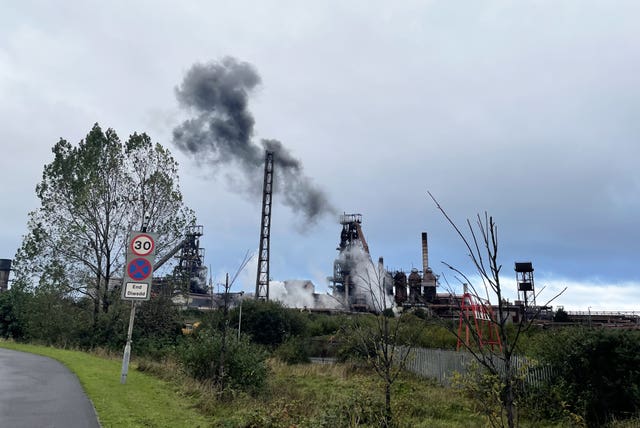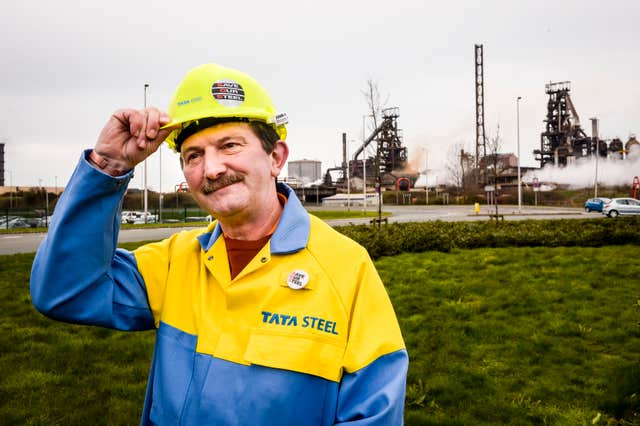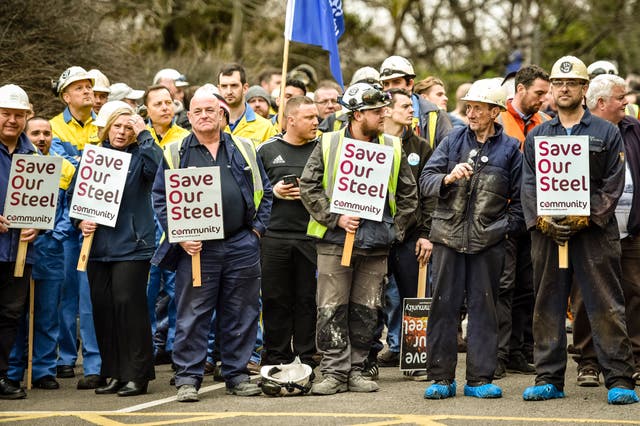‘Difficult’ day as last blast furnace shuts down at Port Talbot steelworks
Tata Steel UK chief executive Rajesh Nair said he is conscious of how ‘difficult’ it will be for everyone as production comes to an end.

It is a “difficult” day for steel workers in Wales, the chief executive of Tata Steel acknowledged as the shutdown of the last blast furnace in Port Talbot began.
The company started winding up operations at blast furnace number four at the UK’s largest steel plant on Monday, bringing an end to ironmaking on the site.
The move will see nearly 2,000 jobs lost at the plant, which will transition to greener steel production from 2027.
As the shutdown got under way, large plumes of black smoke could briefly be seen pouring from the plant.

Tata Steel UK chief executive Rajesh Nair said: “I am deeply conscious how difficult today is for everyone associated with our business.
“Throughout this transition we are doing everything possible to minimise the impact on all those who are affected by the changes we are making.
“Today marks a significant event in the history of iron and steelmaking in the UK as the legacy steelmaking assets in Port Talbot close, having reached their end of life.
“It is important at this juncture to pause, recognise and credit the huge contribution of the many thousands of people and the technologies that have sustained our industry and communities here for generations.”
Mr Nair said Port Talbot has often set standards for other steelmakers, and Tata wants a “brighter, greener future” through a £1.25 billion investment in low-carbon scrap-based steelmaking.

The move is expected to secure 5,000 jobs across the UK and “will also give Tata Steel businesses across the UK a competitive market advantage”.
Mr Nair added: “I also believe our ability to supply customers with the highest quality low CO2 steels will provide a catalyst for others to co-invest in the South Wales region, and we look forward to future collaborations between business partners, academia, governments and communities that will secure that future.”
The ironworks will enter a transition phase until 2027 when steelmaking will resume through a £1.25 billion electric arc furnace – part funded by a £500 million grant from the UK Government.
The new furnace uses electric current to melt scrap steel or iron to produce steel, whereas blast furnaces use coke, a carbon-intensive fuel made from coal to produce steel.
Moving to electric arc steel production will reduce the UK’s overall CO2 emissions by around 1.5%.
In its heyday during the 1960s, more than 18,000 people were employed at Port Talbot’s Abbey steelworks.
But the site has gone through many periods of change, which have sometimes resulted in strikes and job cuts.
Indian conglomerate Tata purchased the steelworks in 2007.
Tata Steel has started to share detailed drawings and virtual reality simulations of the new electric arc furnace, with the equipment manufacturer expected to be announced in the coming weeks.
Some of the secondary steelmaking assets and two remaining continuous casters are being retained for major investments in advance of the start of the electric arc furnace.
Welsh Secretary Jo Stevens has said the UK Labour Government is determined to back Welsh steelworkers.
In a statement, she said: “This is an extremely difficult time for all the workers, their families and the wider community affected by Tata’s decision to close its remaining blast furnace at Port Talbot.
“This Government will support those affected and it is why, within weeks of taking office, we secured a better deal which secures the future of steelmaking in Port Talbot, lays the foundations for future investment and enhances protections for the workforce.
“We have also quickly released millions of pounds of funding from the Transition Board to support businesses and workers.
“Applications for that funding are now open and more will follow very soon.
“This Government is determined to back workers and businesses in our Welsh steel industry whatever happens.”

Dean Cartwright, the works manager for coke, sinter and iron, said local residents will see larger plumes of steam coming from the furnace as production is wound down, as well as prolonged “whooshing” sounds.
“We have started to change the burden – the raw materials we put in the top of the furnace – to make sure the slag formed on top of the iron is the right type for this process, and reducing the amount of coal we inject into the furnace,” he said.
“Over the next four days, we will stop adding new raw materials and bring the burden down to low levels within the furnace.
“Please remember that we have our experts monitoring every single aspect of this process as it progresses, to ensure we bring the furnace to a close safely and calmly.”
Earlier this month, the UK Government announced a £500 million package to help the Port Talbot plant transition to greener, low-carbon steel production.
It has also improved the redundancy package on offer to workers – with full-time staff getting a minimum of £15,000, plus a £5,000 retention payment and paid-for training.
Under the deal, the Government can claw back some of the £500 million invested if Tata does not fulfil its commitments, which includes retaining 5,000 jobs across its UK businesses post-transformation.
Tata will also be releasing 385 acres of the Port Talbot site for industrial redevelopment.
Around 500 jobs are expected to be created during the construction of the electric arc furnace.
Leader of the Welsh Conservatives Andrew RT Davies described it as a “very sad day for Wales”, particularly the steelmaking communities.
He said: “The loss of traditional steelmaking in Wales is yet another blow to our cultural and industrial heritage.
“We have to ask ourselves if our industrial strategy is really working in our favour, and level the playing field in favour of our communities.”
Plaid Cymru has argued that Labour and the Conservatives share the blame for the lack of an industrial strategy.
Economy spokesman Luke Fletcher said: “During the general election, Labour promised a better deal for the Port Talbot steelworks.
“Today the second of its two blast furnaces shuts down. This is more than just a factory closing, it’s the end of Welsh steelmaking and the livelihoods of countless workers and families.”
Mr Fletcher said that while other nations have recognised the importance of domestic steel production and actively subsidised it, the UK has failed to do so, making the country reliant on imports.





